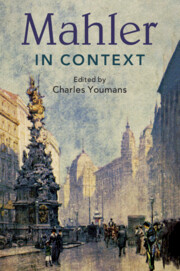Book contents
- Mahler in Context
- Composers in Context
- Mahler in Context
- Copyright page
- Dedication
- Contents
- Figures
- Music Examples
- Notes on Contributors
- Preface and Acknowledgments
- Abbreviations
- Part I Formation
- Chapter 1 Family Life
- Chapter 2 A Childhood in Bohemia
- Chapter 3 Music in Iglau, 1860–1875
- Chapter 4 Student Culture in 1870s Vienna
- Chapter 5 Viennese Musical Associates, 1875–1883
- Chapter 6 Becoming a Conductor
- Chapter 7 Between “Thrice Homeless” and “To the Germans in Austria”
- Part II Performance
- Part III Creation
- Part IV Mind, Body, Spirit
- Part V Influence
- Further Reading
- Index
Chapter 5 - Viennese Musical Associates, 1875–1883
from Part I - Formation
Published online by Cambridge University Press: 18 December 2020
- Mahler in Context
- Composers in Context
- Mahler in Context
- Copyright page
- Dedication
- Contents
- Figures
- Music Examples
- Notes on Contributors
- Preface and Acknowledgments
- Abbreviations
- Part I Formation
- Chapter 1 Family Life
- Chapter 2 A Childhood in Bohemia
- Chapter 3 Music in Iglau, 1860–1875
- Chapter 4 Student Culture in 1870s Vienna
- Chapter 5 Viennese Musical Associates, 1875–1883
- Chapter 6 Becoming a Conductor
- Chapter 7 Between “Thrice Homeless” and “To the Germans in Austria”
- Part II Performance
- Part III Creation
- Part IV Mind, Body, Spirit
- Part V Influence
- Further Reading
- Index
Summary
The composers, performers, teachers, and fellow pupils with whom Mahler rubbed elbows during his first period as a resident of Vienna represented the upper echelon of European musical culture. He was both eager and well suited to make the most of this opportunity; his musical ability, his capacity for work, and his fervent sense of ethical responsibility to the art encouraged him to draw all he could from this rich array of colleagues. This chapter presents salient information on these figures, concentrating on teachers (Josef Hellmesberger, Julius Epstein, Robert Fuchs, and Franz Krenn), student colleagues (Ludwig Krzyzanowski, Hugo Wolf, Hans Rott, and Arnold Rosé), and establishment figures (Johannes Brahms, Eduard Hanslick, and the peculiar outsider Anton Bruckner). By the time of his departure in 1883, Mahler would know the city from the inside, but that experience would not protect him in his maturity from the hard lessons learned by so many of his teachers, peers, and idols: that living as a Viennese musician inevitably left scars.
Keywords
- Type
- Chapter
- Information
- Mahler in Context , pp. 40 - 47Publisher: Cambridge University PressPrint publication year: 2020

